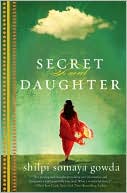

 |

|

The average rating for Secret Daughter based on 2 reviews is 2.5 stars.
Review # 1 was written on 2011-01-01 00:00:00 Robert Pugach Robert PugachMeh. Not a bad story, but too superficially rendered for my taste. Kavita, a poor village woman, has just given birth to an infant daughter she names Usha. Terrified that her husband will murder the daughter because she's a girl, she journeys to Mumbai to place Usha in an orphanage. Meanwhile, Somer and Krishnan, a California couple struggling with infertility, decide to adopt an Indian orphan and end up with Usha. The book follows the twists and turns in these characters' lives as Kavita and her family experience changes of location and fortune and Somer and Krishnan raise Usha (whom they call Asha) who eventually seeks her roots in India. There were moments in this book which resonated and smacked of psychological complexity. Somer initially finds it difficult to bond with her new infant; Kavita comes to appreciate her husband despite his flaws; Kavita's husband eventually regrets and examines his zealousness to get rid of his infant daughter. But for the most part, the story was told in a way that seemed almost rushed as it spanned two decades. I didn't feel that I got to know any of the characters; the vicissitudes in their relationships and fortunes passed me by without my getting caught up in them. Where I often find myself complaining about the slow pacing in books, this was a case where the rapidity with which events unfolded precluded my feeling anything about them. It wasn't a bad book, but the fact that it could have been so much better than it was made for a disappointing reading experience. Not to mention the high goodreads rating and Amazon's placing it on a list of 100 Best Books of 2010. |
Review # 2 was written on 2012-08-07 00:00:00 Ann Morse Ann MorseSPOILERS This novel proudly boasts a #1 Canadian Bestseller sticker. I personally can't understand why. In 1984, an Indian woman named Kavita gives birth to a baby girl. Fearful that her husband, Jasu, will dispose of this baby the same way he did to their first daughter, Kavita and her sister deliver this baby to an orphanage in Bombay, but tell Jasu that the baby died in the night. A year later Somer and Krishnan Thakker, an American-Indian couple, adopt the baby and bring her home to California. Kavita mourns for her secret daughter even while raising her third child, the long-awaited son, and while learning to accept her husband for who he is. The baby, named Asha, grows up to be a promising journalist, and wins an internship with a major newspaper in India, so she travels to her country of birth for the first time and lives with her father's family, who are strangers to her. She of course seeks out her birth parents, but she never meets them face-to-face, finally coming to accept that her adopted family has given her everything she needs. This book should have been a powerful and emotional read. True, it sheds light on the complexities of family, as well as the terrible living conditions that many Indians suffer. However, any child growing up in twenty-first century North America should be somewhat aware of the devastating contrast between living in India and living in North America. Asha isn't. Though her adoptive mother's surpression of her daughter's Indian heritage can be blamed for some of her ignorance, this young woman is a budding journalist. Should she not have some global awareness of international issues, especially those that relate to the country in which she works? It is hard to be patient with her as she slowly matures through the time she spends in India. When she finally comes around, it almost feels too late. I felt the same frustration with Somer. The character is instantly unlikeable, ignorant and dismissive of her husband's heritage. Any sympathy the reader feels for her struggles with infertility are instantly erased when she arrives in Indian and labels the men "disgusting pigs". Perhaps it is because I read this book immediately after reading THE LOST GIRLS, in which the authors are open-minded to every type of person they encounter, but I could not tolerate Somer's prejudice. She, like her daughter, experiences an epiphany in the error of her ways, but she is in her mid-fifties at this point, after almost thirty years married to an Indian man. It is much too late. I could go on about my thoughts on the other characters, but I don't want to drag this out. Besides, every reader should form his or her unbiased opinion. I unfortunately found every character two-dimensional and unrealistic... something I did not expect in a novel which receives such high praise and has such an intriguing plot. |
CAN'T FIND WHAT YOU'RE LOOKING FOR? CLICK HERE!!!